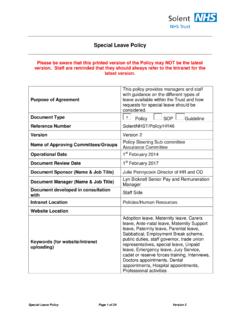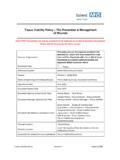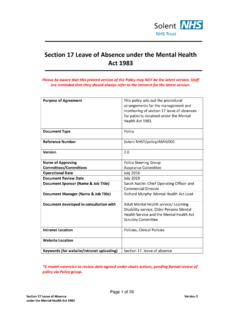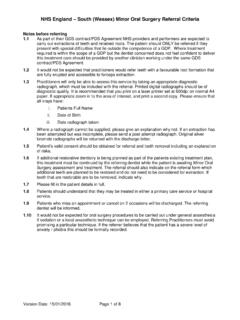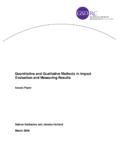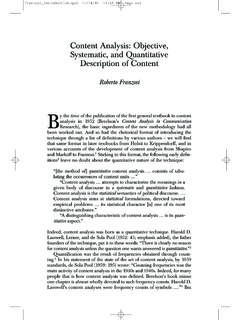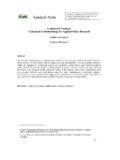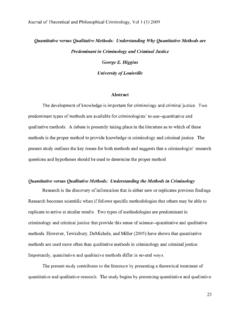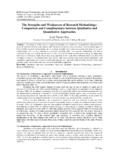Transcription of Critical Appraisal and Interpretation of Qualitative …
1 School of Health Sciences and Social Work Critical Appraisal and Interpretation of Qualitative Evidence School of Health Sciences and Social Work Focus of this presentation Critically appraising a Qualitative paper using the Critical Appraisal Skills Programme (CASP) worksheet for Qualitative research School of Health Sciences and Social Work Screening Questions What is Qualitative research? Why would we use Qualitative research? What types of questions does Qualitative research ask? How does Qualitative research differ from quantitative? What can Qualitative research contribute to healthcare? Critical Appraisal Skills Programme (CASP) School of Health Sciences and Social Work What is Qualitative research? So, what is Qualitative research? What is Qualitative research? Not everything that can be counted counts and not everything that counts can be counted PEOPLE Experiences Meaning Feelings Words Naturalistic Multiple realities OBJECTIVE EASY SMALL SAMPLE X Y TOUCHY-FEELY School of Health Sciences and Social Work Life History Study Naturalistic enquiry Interpretative Grounded theory Different types of Qualitative research Different types of Qualitative research Discourse Analysis Ethnomethodology Action research Interactionism Write and Draw Rapid Appraisal Content Analysis Phenomenology Conversational Analysis Participative research Cognitive Anthropology Feminist Research Ethnoscience Narrative Humanistic Research Qualitative Evaluation Case Study Heuristic Research Symbolic Interactionism Hermeneutics Evaluative Research Ethnography School of Health Sciences and Social Work Reading Qualitative research Reading Qualitative research.
2 Important questions What is the research question and will a Qualitative approach answer it? What does the research promise to offer healthcare? Is the research relevant? School of Health Sciences and Social Work Sampling Who do we collect data from in Qualitative research? How many people are enough? How do we find people? Critical Appraisal Skills Programme (CASP) School of Health Sciences and Social Work Sampling: How do we find people to take part in Qualitative research? Convenience Sampling Purposive Sampling Snowball Sampling Theoretical Sampling School of Health Sciences and Social Work Sampling: How do we know we have enough people? Have we stopped finding any novel data? (Reached data saturation) Are there enough people to cover the range of different experiences? People of different ages, with different disease severities (provide a concrete example) School of Health Sciences and Social Work Reading Qualitative research Reading Qualitative research: Important questions Have they used an appropriate sampling strategy?
3 Have they described the sample well enough for you to decide whether this applies to your patient(s)? How did they decide how many people to sample? Was this appropriate? Do we know who collected the data? Do we know who didn t take part? And if not, why not? School of Health Sciences and Social Work Data collection What data collection tools are used in Qualitative research? What are their advantages/disadvantages? How do we decide which tool to use? School of Health Sciences and Social Work Data collection FOCUS GROUPS Affordable and useful to explore group interaction, and discuss/ debate range of experiences. Can be difficult to arrange. DIARIES Affordable, and good at recording how people feel at the time. Difficult to ensure that the data is appropriate. DOCUMENTS Affordable, but data not recorded with research in mind. INTERVIEWS Useful to explore in-depth experiences, but expensive to conduct OBSERVATION Good to record actual rather than reported behaviour.
4 Misses different perspectives. Potential ethical issues. How is data collected in Qualitative research? School of Health Sciences and Social Work Reading Qualitative research Reading Qualitative research: Important questions Was the data collected in a way that addressed the research issue? Do we have enough detail of how and where the data was collected? Are the limitations of the chosen method presented? Was the method of data collection justified? School of Health Sciences and Social Work Reflexivity How might the researcher affect Qualitative research? School of Health Sciences and Social Work The importance of reflexivity In Qualitative the researcher has an influence on the data in a number of ways: Influence on the participant Body language Type of questioning Interview schedule Manner with participant Existing relationship with the participant During data analysis: Pre-existing ideas about what they think they will/want to find It is important that the researcher considers their influence on the participant and the analysis, and that they present an account of their position so readers are able to judge this.
5 School of Health Sciences and Social Work Reading Qualitative research Reading Qualitative research: Important questions Did the researcher s own experience inform the research question? Has the researcher talked about who they are and the influence they may have on the data? Did the researcher do anything to limit their impact on the data? School of Health Sciences and Social Work Ethical issues What ethical issues might arise in Qualitative research? School of Health Sciences and Social Work What are the ethical issues involved in Qualitative research? As with all research: If conducted within the NHS must have LREC approval. All participants should give informed consent Data protection and confidentiality issues (presentation of anonymous quotes) Dealing with sensitive issues: Effect on the participant and the researcher Potential to reveal issues such as abuse or neglect Safety of the researcher whilst collecting data outside of the institution School of Health Sciences and Social Work Reading Qualitative research Reading Qualitative research: Important questions How was informed consent, confidentiality and data protection managed?
6 Had the researcher considered the ethical implications of the research? Has approval been sought from an ethics committee? School of Health Sciences and Social Work Data analysis How is data analysed in Qualitative research? How is rigour ensured in Qualitative research? School of Health Sciences and Social Work What kind of data is produced by Qualitative methods? AUDIO Recordings of interviews or focus groups These will usually be transcribed before analysis VISUAL Videos of observations (perhaps including audio) Drawings Photographs WRITTEN Documents Diaries Notes from observations School of Health Sciences and Social Work Analysing Qualitative data The aim of data analysis is to go from a large amount of data that is in no particular order to a nice ordered summary of what the data is telling us. The most important thing is to make sure that the summary really does reflect what participants have said and that is the really tricky bit!
7 School of Health Sciences and Social Work So how is data analysed? DISPLAY THE DATA If necessary, transcribe the recordings from interviews or focus groups The data is read and any field notes added Read the whole transcription and add analytical notes Interviewer: So, you were given a prescription by your doctor for antibiotics, can you tell me what happened next? Mary: Well, I left the doctors and I meant to go straight to the chemist to put in my prescription. But I really was feeling very ill and it is a long way to the chemists. I only live about 2 minutes walk from the doctors so I went home instead. After I got home I started to feel even worse and I didn t have anybody to ask to go and pick up my prescription for me. By the time I felt well enough to get to the chemist s I thought it was probably not worth it anymore. She looked like she felt a bit guilty about this. Followed this up later on.
8 Intention? Does she mean this or does she think she has to say it? School of Health Sciences and Social Work So how is data analysed? DATA REDUCTION Identify significant statements/units of meaning Interviewer: So, you were given a prescription by your doctor for antibiotics, can you tell me what happened next? Mary: Well, I left the doctors and //I meant to go straight to the chemist to put in my But I really was feeling very ill and it is a long way to the chemists. I only live about 2 minutes walk from the doctors so I went home instead. //After I got home I started to feel even worse// and I didn t have anybody to ask to go and pick up my prescription for me. //By the time I felt well enough to get to the chemist s I thought it was probably not worth it She looked like she felt a bit guilty about this. Followed this up later on. Intention? Does she mean this or does she think she has to say it?
9 School of Health Sciences and Social Work So how is data analysed? DATA Interpretation Group into categories Develop into themes Check representativeness of these from your transcripts Find examples of these Display Qualitative research and analysis represents an inductive approach to research where we start with real-life data and work towards abstract ideas or general principles. School of Health Sciences and Social Work What do Qualitative findings look like? Qualitative data analysis often produces themes: Themes are used to describe the data in a concise and easy to understand manner Themes should be used to express the experiences of all participants School of Health Sciences and Social Work SYMPTOM EXPERIENCE FEAR BLAME AND STIGMA Patients had not realised that their symptoms were indicative of anything serious Patients delayed going to the doctor because they were scared of finding out that they had cancer or were scared of the treatments.
10 KNOWLEDGE Patients did not have much knowledge about lung cancer and its symptoms Patients were worried that they would be blamed or stigmatised if they were diagnosed with lung cancer. CULTURE Some patients, especially males, felt the need to be stoic about their illness Tod, Craven & Allmark (2008), looked at the reasons for diagnostic delay in patients with lung cancer and found the following themes. School of Health Sciences and Social Work Dependability and confirmability How do we check the dependability and confirmability of the reported findings? Can we follow the decision trail? Is there an audit trail? Have I been given enough information about the methods used? Is there enough detailed description for us to interpret the meaning and context of what is being researched? Can we trust the analysis? How careful was the researcher to prevent bias affecting their analysis? School of Health Sciences and Social Work Reading Qualitative research Reading Qualitative research: Important questions Is there an in-depth description of the analysis process?
